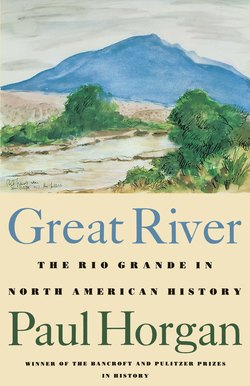Читать книгу Great River - Paul Horgan - Страница 43
На сайте Литреса книга снята с продажи.
Оглавление22.
Afterthoughts
Though there were afterthoughts that wanted expression in the official terms of legal government, and found it. The battle, the war was won, but the Governor set about confirming the gains already made in his province by civilization as he represented it. If he re-examined the legal opinion of December twenty-second, he found full justification to punish the leaders of the insurrection, so long as “divine and civil” law were properly administered. It was therefore with every proper observance of the Spanish passion for legality in its finest details that he ordered a trial at the pueblo of Santo Domingo down the river of those captives brought from Ácoma by Vicente de Zaldívar.
The prisoners were charged with killing eleven Spaniards and two Indian servants in the massacre of December; and further charged with refusal to submit peacefully, deliver the murderers, and accept due punishment when the army went in January to Ácoma to accomplish these ends.
The trial was held in early February, 1599, with the Governor presiding. It was a medium through which the Spaniards heard once again the chronicle of Ácoma treachery and Spanish valor. The prisoners—a throng of them—had no advocate. Witnesses described known perfidies. The corporate indignation of the stronger of two societies energized itself emotionally. Who could doubt that punishment—any conceivable punishment—paled beside the acts that cried for it? Virtue was not a strand of life interwoven with evil. It was a dogmatic posture which for its own protection could justly resort to any devices of pain and mutilation. The law took for granted in the last year of the sixteenth century that acts of crime done by a human body called for the breaking of such a body in degrees varying with the offense. Such degrees could hardly be arrived at without due process of law, and the Governor heard the witnesses one by one as they came in their soldierly leather, steel, feather and linen and wool to speak. The testimony was all in by the eleventh, and on the twelfth of February, the head of the government was ready to respond with the sentences, which would be properly recorded and notarized.
The Governor ordered that: all male Ácomese prisoners over twenty-five years old be condemned to have one foot cut off and to give twenty years of personal service (assignments to be made later); all males over twelve and under twenty-five years of age, to give twenty years of personal service; all females over twelve years of age, to give twenty years of personal service; and two Indians from the towns in the far west who had been captured at Ácoma, to have their right hands cut off and to be sent to their western homes to warn others of the power that dwelled upon the river.
The expression “personal service” with its limitation of term was preferred to the term slavery. Among the assignments made later was that of sixty girls of Ácoma who, escorted by Captain Pérez de Villagrá, were sent to the viceroy in Mexico for distribution among the convents, to be educated and converted, in alien peace. Pérez left in March, 1599, bearing a letter to the Viceroy from the Governor, asking for reinforcements in men with families “who are the solid rock upon which new republics are permanently founded,” and arms, and ammunition; while the colony got on with the spring planting.
